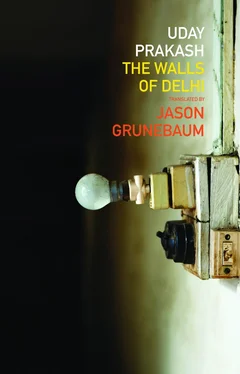Reports of what was really happening were so obscene, so rotten, that bringing them into a poem or short story would simply ruin the poem or the short story. So most poets and writers avoided writing about what went on — but they kept on writing, and kept on winning awards.
So, please come with me, and we’ll desist for now with these accounts of what’s going on, and instead travel to Ambedkar Nagar public housing flat C-7/3, Ashok Vihar, where Shobha and her family now reside.
***
Amarkant was five by now, and had started attending Blue Bells school. Shobha had purchased a sewing machine. She sewed for friends and neighbours, and took home fabric from a few shops in the bazaar to stitch — the mortgage payment and school fees were due at the beginning of each month. Gulshan Arora died in the meantime, and his son Kishan had sold the shop in Vijaynagar. Chandrakant found work in another shop in Deep Market in Ashok Vihar. Every day he walked to and from work.
I had moved right outside Delhi with my family, to Ghaziabad. Chandrakant had my new address and number.
***
I had a premonition that at any moment Chandrakant might call me with news of Suri’s death. He was by now eight years old. Not only was he still alive, having improbably fought and confounded his date with death, but the mind inside his malformed, ill-proportioned, misshapen head was so remarkable and strangely curious that anyone who heard him talk was stunned, confounded, flabbergasted.
For example, one day he said to Shobha, ‘Ma, you’re spending your eyesight so you can make Amar’s school fees. If you would only sell your eyes, you could put him in a cheaper school.’
One night Shobha awoke to find Suri on the balcony wrapping twine around his head. His lips were shut tight, and his face was wrinkled up in pain. His lungs were making that whistling sound while he tried with all his might to breathe in the outside air. His eyes were red and bulging. When Shobha came to him and placed her hand on his back he said in his hoarse voice, ‘Doctors only know how to cure diseases that would cure themselves anyway, without any treatment.’ He struggled to take a breath, and then let out a deep sigh. ‘Hospitals are built for the same people that cars, hotels, airplanes, and big buildings are built for.’
One day he announced, ‘The disease inside of me is because of that dirty drainage ditch in front of our half flat.’ He looked off into the distance for a bit before adding gravely, ‘“Mangosil” is the name of the disease, and the virus that causes it is called, do you know? Poverty.’
One day when Amar was going to school, Suri said, ‘No matter how much kids study in school, they could learn more without school. People who send their kids to school are those who want to get rid of them.’ Again a vacant look came over his face for a bit and then he added, in the manner of a philosopher, ‘What is true is that those who are more well-educated inevitably work as underlings or servants for those less well-educated. School is a servant factory. The most powerful, richest, and best-off people in the world are always less well-educated.’
Suri, because of his illness, studied at home. He read the paper, watched TV, listened to the radio, and began going to the Jupiter Network cyber café in nearby Neemri market. Everyone in the area began to recognise him: the shape of his body, with the skinny trunk, oversized head, and funny way of walking.
One day Suri said, ‘The reason that people stare at me is that they’ve never seen an ant, with its big head, dressed in man’s clothing.’ He said this without laughing, but with eyes red, lips parched, and trembling a little. He continued, ‘Only ten to twenty per cent of people in this world are human. The rest are ants, cockroaches, dogs, pigs, or oxen.’ He flashed an ironic smile. ‘I mean, look at this family. Papa’s an ox, Mummy is a machine, and Amar’s a cockroach. And I’m just a little worm that crawled out of the gutter one night and snuck into Mummy’s belly.’
In the middle of the night one night, Suri’s hands were pressing against the sides of his head, struggling to take each breath. ‘My head keeps getting bigger because it keeps knowing things little heads can’t know, or don’t want to. If they tried knowing them, their heads would grow as big as mine.’
Red flashed from his eyes like sparks. ‘I know full well that the US invaded Iraq only for the oil. But they’ll be able to buy in oil whatever they’ve spent to hide this fact. The US would invade India, too, if they extracted that much oil. Just wait, one day either the whole world will equal the US, or it’ll be the whole world minus the US.’
One night Suri, who was almost eight-and-a-half, was writhing in pain, crying like any other kid his age. It was the first time he acted like this. Normally when in pain he went out quietly and fought the pain on his own. He lay down and put his head in his mother’s lap. ‘Mummy, just find me some poison,’ he whimpered. ‘I can’t take it anymore.’ His tears wouldn’t stop. In between sobs he said, ‘I just don’t understand why people are born whose lives are filled with so much hurt.’ A little while later his pain subsided. ‘Mummy, I need a pill the size of the sun to make the pain go away.’ Then, still in tears, ‘Tell Papa I want to live, Mummy. I don’t want to die yet. Not this soon. There’s no way we might be able to find the money to be able to afford to cure me?’
Suri’s voice was full of such hopelessness and longing. Shobha caressed her son’s head in her lap and herself started to weep. What could she possibly do to save the life of her son? Ideas failed her.
That night Shobha had a deep change of heart. She calculated that even if they sold the house and everything they owned, and recovered their mortgage, they would still be short of the one-and-a-half or two million they needed to have Suri treated properly, or even cured. Their only recourse was to offer their prayers, which they did anyway. And it was only due to the grace of god that Suri was still alive. She decided that from that day forward, she would try to focus less attention on Suri’s eventual death and create space for him where he didn’t have to be continuously traumatised by his ‘fixed mortality.’ She told Chandrakant her idea.
Suri started watching movies on the VCR like Qayamat se Qayamat Tak, Lagaan, Devdas, Main Hoon Na, Kaun. Shobha and Chandrakant took him to out to the movies a couple of times. Both of them were acutely aware that Suri was only going to live as long as he was going to live. So they wanted him to give him as many experiences as they could, within their means. Sweets, chaat, pizza, hamburgers, Pepsi, Coca Cola, amusement parks like Appu Ghar, the zoo, the Qutub Minar.
Chandrakant told me about a truck that had run off the road and hit a tree. The driver was killed, and his passenger was taken to the hospital. Chandrakant, Shobha and Suri were on their way home in a rickshaw. Suri too saw the tree and almost ran to it; its trunk was damaged in several places. Suri kept quiet for a while before saying, ‘The tree is always silent, sitting in its own spot. Even if it wanted to fight someone, like that tree, it would only be to save itself.’
Even though Suri’s strange, tangled thoughts deeply vexed people, Chandrakant and Shohba felt sometimes the real kid inside would emerge, the one that was simply and straightforwardly a child his own age, with the same wishes, desires, obstinacy, tantrums. He was often quite stubborn about getting to eat the foods he liked. Like besin sweets, red amaranth, fried moong.
Sometimes when people paid more attention to Amar, they saw the envy and jealousy in Suri’s eyes. It was true that fiveyear-old Amar had more stuff than his older brother, Suri. The main reason was that he went to school. He had a cute little vinyl backpack with Donald Duck and Roger Rabbit on it. Plus notebooks and lots of books with all sorts of pretty pictures. Amar also had more clothes. He had two changes of his school uniform, two pairs of socks, one pair of shoes, two ties. He had a nice little blue square tiffin lunchbox that held another little compartment inside. Shobha packed parathas in the tiffin and put a few cookies in the compartment inside. He also had a red water bottle in the shape of an elephant and if you lifted up its trunk it sprayed blue water.
Читать дальше










